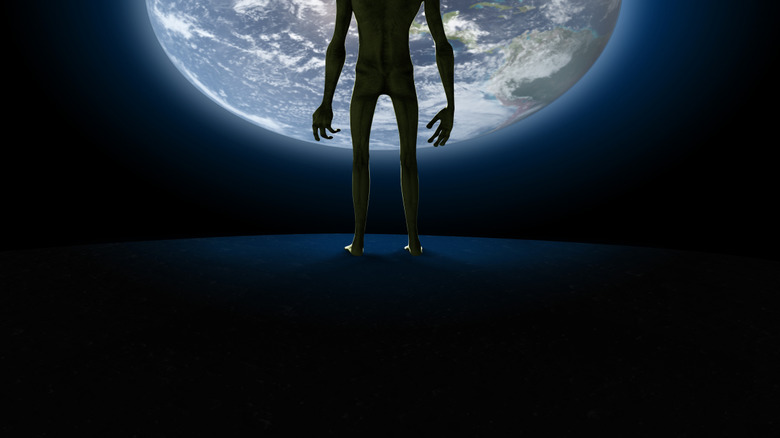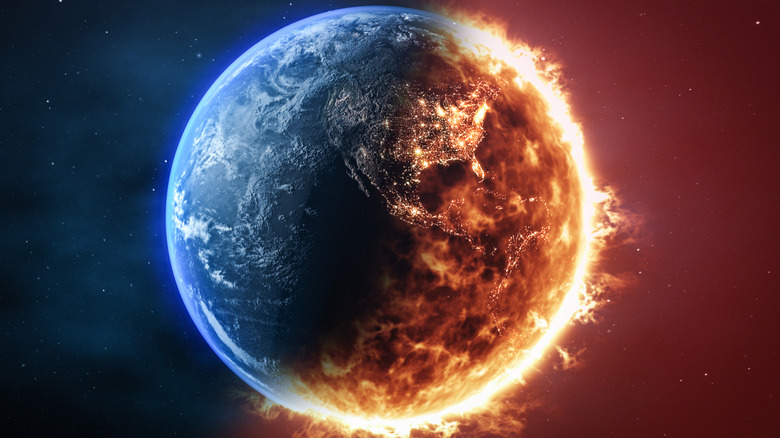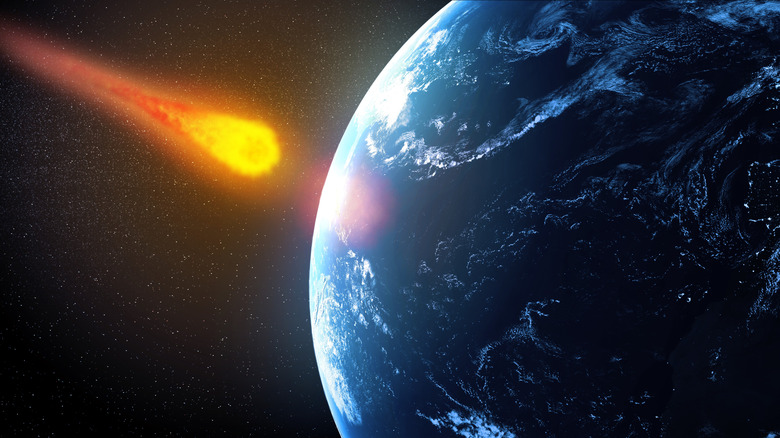Every Way Stephen Hawking Predicted The World Ending
We may receive a commission on purchases made from links.
Is there anyone who's name is more synonymous with astronomy than Stephen Hawking? Okay, maybe Eddie Redmayne, but that's beside the point. For the 76 years he was with us, Professor Hawking spent countless time and effort bringing complex data about the universe to the masses, breaking it down into terms any curious mind could understand. Maybe he did it to make more people interested in the ways of the world or maybe he understood that bringing science to the masses could prevent Armageddon. Maybe it was a combination of both.
Professor Hawking saw stark warnings in the way humans lived and how easily we could end up on a path of planetary destruction. Back in 2000 while addressing President Clinton's Millennium Council, he said, "Even if we don't destroy ourselves completely there is the possibility that we might descend into a state of brutalism and barbarity like the opening scene of Terminator." Previously, he estimated it would take us another 1,000 years to decimate humanity; in 2017, a year before his death, that timeline had shortened to just 100 years. So, how did Stephen Hawking predict the end of the world? Unfortunately, he saw multiple options — so here's a compilation of his thoughts and warnings, detailing the mechanics behind each prediction and where we are today. Are we about to prove him right or wrong? Let's see how far we have, or haven't, come.
Aliens discovering Earth
Many people are enthralled with the idea that an intelligent alien life form will find our planet and establish contact. Professor Stephen Hawking, however, was not one of them. In 2010, he told a Discovery Network documentary (via BBC), "If aliens visit us, the outcome would be much as when Columbus landed in America, which didn't turn out well for the Native Americans ... We only have to look at ourselves to see how intelligent life might develop into something we wouldn't want to meet."
Obviously, as of this writing, there is no known evidence that an extraterrestrial life form has made contact with — or visited — our planet. But that hasn't stopped us from trying to reach them or searching for worlds where aliens might be hiding. A 2025 paper in The Astrophysical Journal Letters hypothesized that we may be able to detect life on distant planets by looking for a class of gases known as methyl halides that could potentially support microbial life. Maybe it's not the E.T. some are hoping for, but every small step is still one step forward.
Human aggression winning out
When Professor Stephen Hawking died in 2018, he had already felt humanity was moving in such a way that our aggression towards one another would destroy everything. During a 2015 interview (via NBC News), he said, "The human failing I would most like to correct is aggression. It may have had survival advantage in caveman days, to get more food, territory or partner with whom to reproduce, but now it threatens to destroy us all."
Unfortunately, humanity's aggressive behaviors seem to only have heightened since his death. The non-profit Armed Conflict Location & Event Data (ACLED) reports that since 2019, the number of global conflicts has doubled, and one out of eight people around the world were exposed to conflict in 2024 alone. Meanwhile, a 2023 study in the Yale Journal of Biological Medicine found that as the ambient temperature of a region rose by one degree Celsius, the number of violet deaths increased by 1.4%.
Overpopulation causing an increase of energy consumption
Professor Stephen Hawking saw the potential environmental problems from an ever growing population and its increased energy usage serving as a one-two punch that could be our ultimate undoing. He told the Millennium Council that, "the world's population which is a measure of our technological ability to preserve life and feed ourselves has risen steadily ... In the last two hundred years the growth has become exponential, that is, the population grows by the same percentage each year. Currently the rate is about 1.9% a year ... [which] may not sound very much but it means that the world population doubles every 40 years ... By the year 2600 the world's population would be standing shoulder to shoulder and the electricity consumption would make the Earth glow red hot."
So, how closely have we heeded his warning? The good news is that it's not entirely accurate; the bad news is that it's also not that far off. The United Nations Department of Economic and Social Affairs, Population Division report, "World Population Prospects 2024" shows the growth rate has slowed to 0.85% per year, a sharp contrast to the 1.9% from Hawking's speech. However, the International Energy Agency (IEA) in its "Global Energy Review 2025" found that during 2024, global energy demand had grown by 2.2%, which is faster than the average rate over the past decade. But it's not all bad; the IEA's report showed that renewable energy was far and away the biggest grower, accounting for 38% of the supply. Meanwhile, natural gas came in second place at 28%, showing the broadening gap and heavy support the world has put towards clean energy sources.
Increasingly advanced weapon tech
Professor Stephen Hawking had grave concerns about how humanity was using advancements in technology to build more lethal weaponry. While he was enthralled with the developments in AI at the time, he also knew that governments focusing their technological research on destruction instead of creating ways to leave the earth could have dire consequences. In 2016, he said, "We are at the most dangerous moment in the development of humanity. We now have the technology to destroy the planet on which we live, but have not yet developed the ability to escape it" (via The Guardian). Hawking was particularly concerned about our potential to return to nuclear warfare. In his posthumously published book, "Brief Answers to Big Questions," he said, ""Nuclear war is still probably the greatest threat to humanity at the present time. It is a danger we have rather forgotten."
Since his warning in 2016, improved weapon tech has only gotten bigger, stronger, and faster. The Congressional Research Service's 2024 report, "Emerging Military Technologies: Background and Issues for Congress," found that the U.S. Department of Defense has increased its spending in AI tech alone from $600 million in 2016 to $1.8 billion in 2024. Meanwhile, the Pentagon requested a budget from Congress of $11 billion for long-range fire research with $4.7 billion of that earmarked for hypersonic missiles.
Climate change
Stephen Hawking was not the first to bring up the dangers we face with climate change, but he certainly was adamant. At a 2017 conference, he told the BBC, "We are close to the tipping point where global warming becomes irreversible." He elaborated in "Brief Answers to Big Questions," "We have presented our planet with the disastrous gift of climate change ... Climate change may kill off the Amazon and other rainforests and so eliminate one of the main ways in which carbon dioxide is removed from the atmosphere. The rise in sea temperature may trigger the release of large quantities of carbon dioxide. Both these phenomena would increase the greenhouse effect, and so exacerbate global warming. Both effects could make our climate like that of Venus: boiling hot and raining sulphuric acid, but with a temperature of 250 degrees Celsius. Human life would be unsustainable. We need to go beyond the Kyoto Protocol, the international agreement adopted in 1997, and cut carbon emissions now."
Once again, humanity has seemingly not heeded Hawking's warnings. NOAA reports that 2024 saw the warmest global surface temperature since 1850, the year we began monitoring it. But there is hope; 142 countries and 1,180 companies have committed to reaching net zero emission targets while the EU's 2019 Green Deal agreement has made significant improvements that have reduced emissions by 51% as compared to 1990s levels.
Donald Trump's policies
While Professor Stephen Hawking was not alive to see President Donald Trump's second term, he was a vocal critic during Trump's first. In particular, he was adamant that Trump's environmental policies were a step backward. He told the BBC in 2017, "Trump's action could push the Earth over the brink, to become like Venus, with a temperature of two hundred and fifty degrees, and raining sulphuric acid ... By denying the evidence for climate change, and pulling out of the Paris Climate Agreement, Donald Trump will cause avoidable environmental damage to our beautiful planet, endangering the natural world, for us and our children." But it wasn't just Trump's climate policies that irked the cosmologist. Instead, he felt President Trump's ascension was representative of a bigger issue. During a 2017 conference in Hong Kong, Hawking told the crowd that Donald Trump was only one of many "right-wing successes" that would have a ripple effect on science and humanity: "With Brexit and Trump ... we are witnessing a global revolt against experts" (via The Independent).
Hawking's negativity towards Trump seems well-founded, at least for climate change. The Washington Post lists 125 environmental protections President Trump tried to remove during his first term, though many were unsuccessful. We can only see what he will do during his second term, but the World Resources Institute predicts he will pull the United States out of the Paris Agreement and slash the budgets for the Environmental Protection Agency, National Oceanic and Atmospheric Administration, and Department of Interior in accordance with the stated goals of Project 2025.
Another asteroid collision
Stephen Hawking believed in history repeating itself, and thus a Chicxulub-type asteroid would only be a matter of time. In his book, "Brief Answers to Big Questions," he said, "An asteroid collision would be something against which we have no defence. The last big such collision with us was about sixty-six million years ago and that is thought to have killed the dinosaurs, and it will happen again. This is not science fiction; it is guaranteed by the laws of physics and probability."
The European Space Agency believes there are currently about 1,770 objects in space that pose a "non-zero impact probability" for striking the earth within the next 1,000 years. However, not all are the 10 kilometer-wide planet destroyer that Chicxclub was, and asteroids big enough to destroy a city only hit the earth approximately once every 250 million years. So while Hawking may be right, it could be a long time before we ever find out.
AI becoming dominant over humans
The world of AI Stephen Hawking knew before his death in 2018 would seem rudimentary at best today. Still, he knew even then that humanity might be playing with fire. During an interview with the BBC, Hawking said, "The development of full artificial intelligence could spell the end of the human race ... It would take off on its own, and re-design itself at an ever increasing rate ... Humans, who are limited by slow biological evolution, couldn't compete, and would be superseded."
Luckily, the debate over whether AI is good or bad is one that humanity seems to have taken seriously. A 2017 report published in the Journal of Artificial Intelligence Research proved pretty accurate, predicting that AI would be able to outcompete humans in a number of tasks, including language translation by 2024, high school essay writing by 2026, and potentially even surgical work by 2053. However, researchers believe that there's only a 50% chance of AI outperforming humans on all tasks by 2062 and automating all human jobs by 2137. So while a 50/50 chance might not sound positive, it's much better than the doom and gloom numbers some sensational media have reported.
A distrust of science
One of the things Stephen Hawking saw that disappointed him most in his lifetime was a growing ambivalence towards science by the public. During a 2017 talk, he waxed philosophical on what he perceived was happening, saying (via The Guardian), "We have come to expect a steady increase in standard of living that science and technology have brought. But people distrust science because they don't understand it or feel they can control it." He remarked to the Radio Times(via The Telegraph), "Science and technology are changing our world dramatically, so it's important to ensure that these changes are heading in the right directions ... In a democratic society, this means that everyone needs to have a basic understanding of science, to make informed decisions about the future."
While there has been a decline in the public's trust of scientists, it's not as bad as you might think. A 2024 survey by the Pew Research Center found that only 23% of Americans surveyed that year said they had a "Not too much/none at all" level of confidence that scientists were acting in the public's best interest. In 2023, 27% of those surveyed felt the same way, so we're starting to see an uptick again in the trust we have for scientists.









